Article 21: Coffee shops – the pride of Italy
The Italian coffee space is the Academy displaying cultural values, national and historical aura. Therefore, displayed in the characteristics of the coffee space is also the pride of Italy.
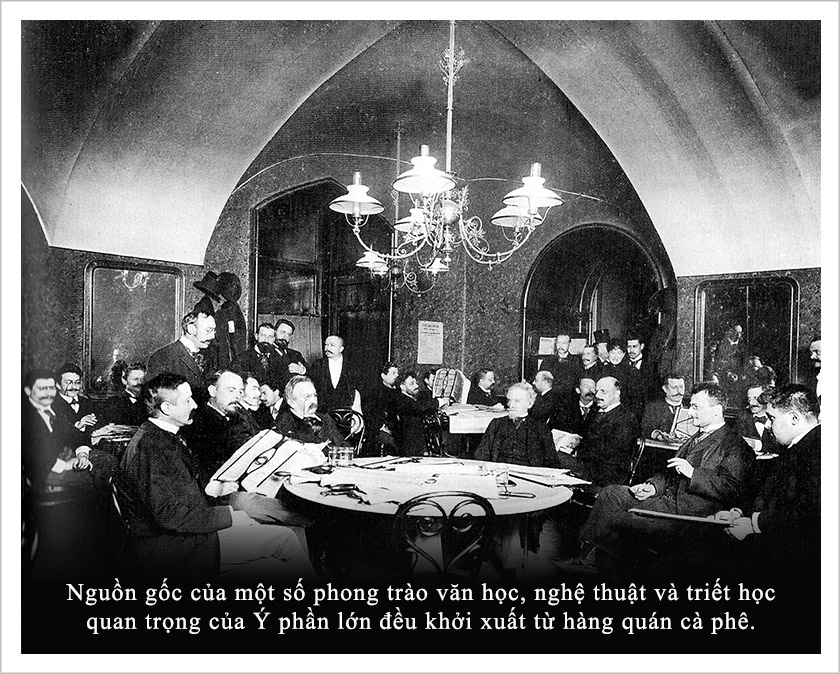
The origins of some of Italy’s important literary, artistic and philosophical movements have largely been traced back to coffee shops.
For Italians, national history is a unique privilege and character not found in any other country. And, an important social space such as a coffee shop has become a place to recreate the glory of civilizations over the centuries, symbolizing Italian national pride.
The Italian coffee space was built and decorated as an architectural wonder. Literary works, paintings, sculptures were displayed according to historical themes and processes from Etruscan to Roman, Renaissance, Enlightenment… as a museum conveying cultural atmosphere. If the Antico Caffè Greco (1760, Rome) was likened to the largest private art exhibition space with more than 300 works of classical and modern painting, the Caffè Museo Atelier Canova Tadolini (1818, Rome) was the a Museum with a sculpture collection that embodied the centuries-old memory of Venice.
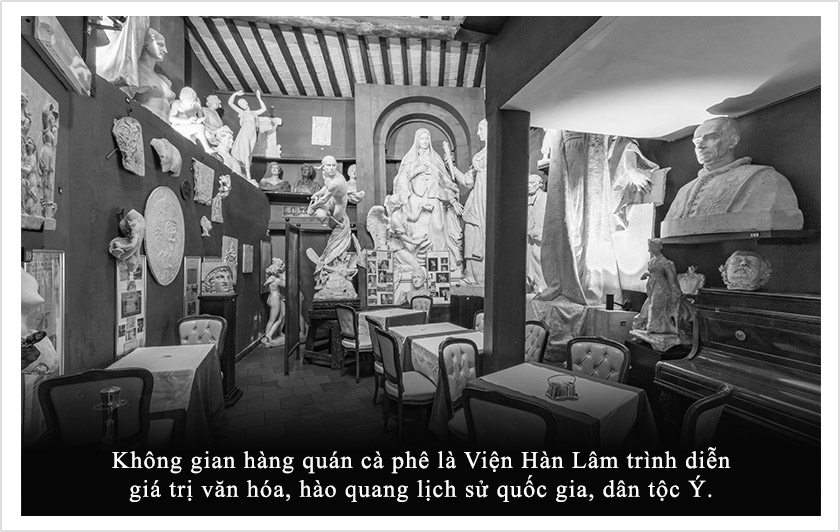
The coffee space is the Academy displaying Italian cultural values, national and historical aura.
In particular, from the 18th to the 20th centuries, the coffee space was considered a cultural center in Italian history. Important influential figures in the fields of Italian literature, philosophy, politics, art… gathered in the coffee space to discuss and develop new ideology. Italy’s most important Enlightenment magazine, “Il Caffè,” published between 1764 and 1766, simulated conversations around a coffee table. The Enlightenmenters chose coffee as a symbol of the “Wise and Creative” people as opposed to beer, which was still a popular drink at the time that obscured human reason. Moreover, the specialty of the cafe was the space to create the exchange of knowledge and the dissemination of new ideas, completely in line with the enlightened ideals and reform issues advocated by the magazine. The magazine “Il Caffè” was considered as the intellectual publication of the progressive class, opening the period of “intellectual transformation” or in other words laying the foundation for the Italian Enlightenment movement.
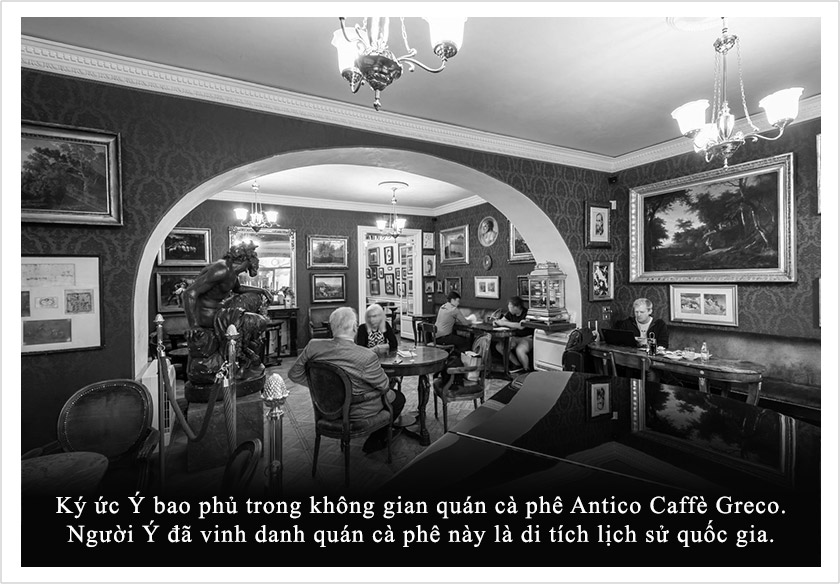
The space of Antico Caffe Greco were covered with Italian memories. The Italians have honored this cafe as a national historic site.
During the period of national unification (Risorgimento), Italy was dominated by the European powers. From Europe’s artistic and cultural leader, Italy became a divided country with no artistic identity of its own. It was during this period that coffee shops were also the place where people with indomitable spirit of the times nurtured ideals and carried out reconstructions of national glory. The Caffè Michelangiolo in Florence was where the Italian painters who started the Macchiaioli art movement revived Italian art, expressing the spirit of nationalism through the creation of new artistic styles based on Italian long-standing artistic achievements. A few decades later, the Caffè delle Giubbe Rosse was honored as the “fucina di sogni e di passioni” (the place where dreams and passions are forged) and where Futurism was founded, striving to create a new identity, inspired by contemporary life and national pride.
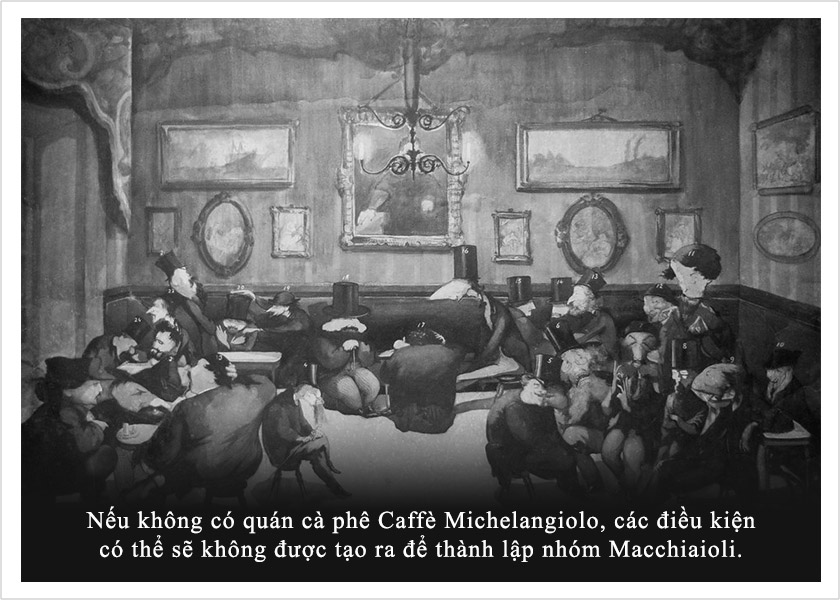
Without Caffè Michelangiolo, the conditions might not have been created for the foundation of the Macchiaioli group.
Meanwhile, the Gran Caffè Gambrinus (1860) was the intellectual and political center of Naples at the end of the 19th century. Napoli was originally one of the oldest urban areas inhabited by humans in the world, and also a multi-ethnic city. This led to divisions because of differences in tradition, culture, religion. Only in the coffee spaces were all views accepted. The Gran Caffè Gambrinus became the place to see all the intellectuals, politicians and artists including Salvatore Di Giacomo, Libero Bovio, Benedetto Croce, Eduardo De Filippo and Enrico De Nicola… come to discuss cultural transitions, upholding the aspiration for national unity, for a unified Italy. From the acceptance and spread of positive thoughts, this cafe created a cake to enjoy with coffee called “Black Babà” to honor the anti-racism movement.
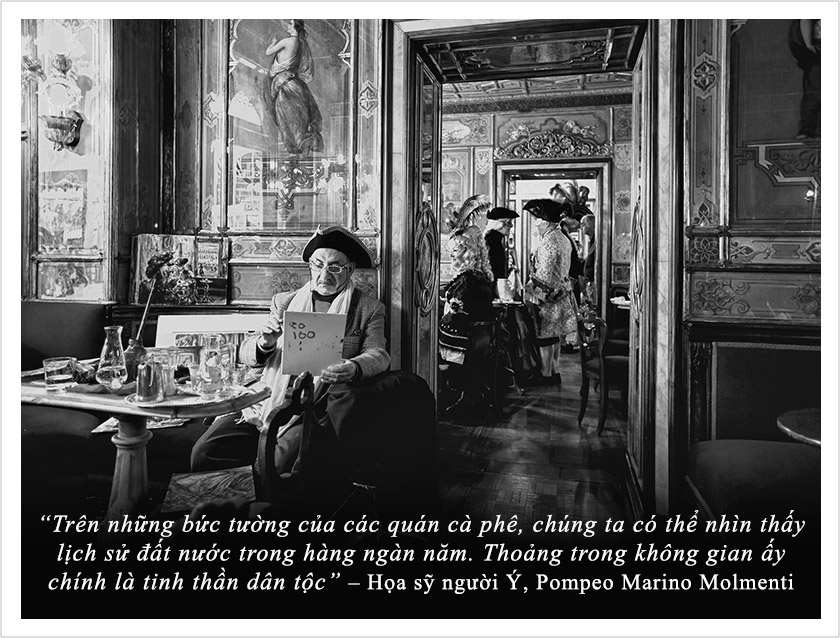
“On the walls of the cafes, we can see the history of the country for thousands of years. In that space is the national spirit.” – Italian painter, Pompeo Marino Molmenti
In Padua, once one of the leading commercial cities of the Roman Empire, the café was the center of the entrepreneurial idea execution of this old town. Author Giuseppe Adami asserted that “All the hearts of Padua beat in a coffee shop” to express that every movement of daily life, negotiations, the latest news of the world… could be found in Cafe. Merchants from all over the world making commercial decisions and ideas right at the coffee table seem to be a familiar sight in Padua.
Italian intellectuals say that Italian cafes are where “culture creates culture”. Since its appearance in Italy, throughout the centuries, coffee shops have been spaces that convey historical and cultural stories. In particular, the coffee shop has played a very important role in the process of renewing political, artistic, and economic ideologies… creating turning points that reshape Italian culture and Italian style, contributing to a Italian national identity as it is today.
Coming up: Worldview in a cup of Italian coffee


